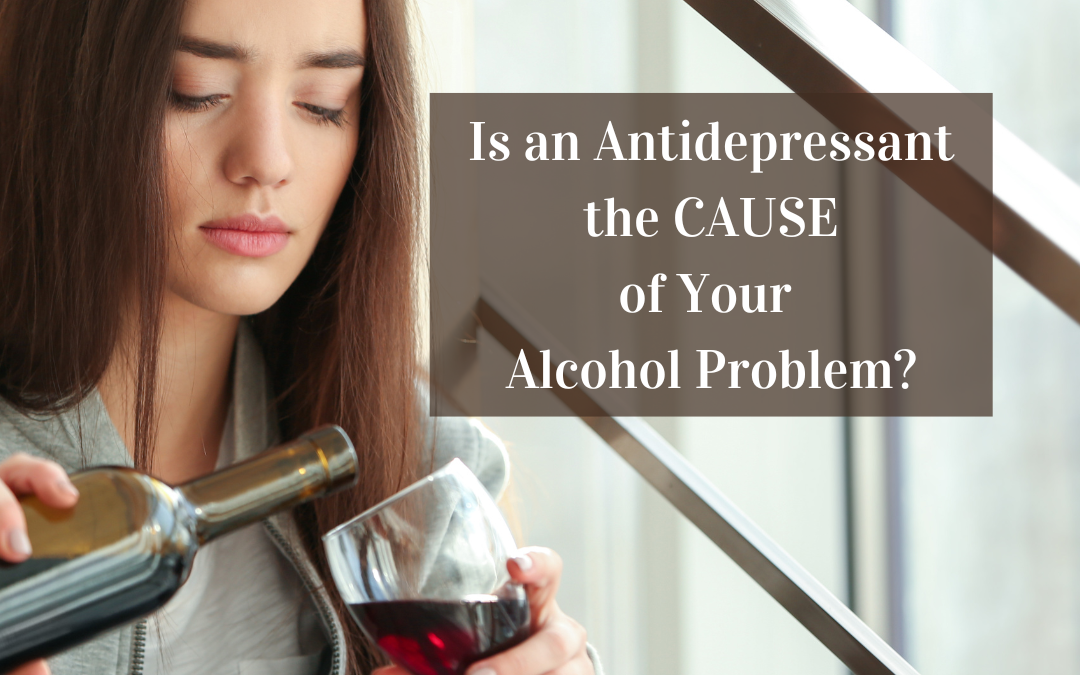If you’re taking antidepressants and finding yourself drinking more, or needing more alcohol to feel relaxed, you’re not alone. Many people who take antidepressants, especially for depression or anxiety, notice they start drinking more often or need more alcohol to feel the same way. This can be tough, especially if alcohol seems to help you cope with feelings caused by the medication. But what if your antidepressant is actually making this worse?
In this post, we’ll explain how antidepressants might be making you drink more and why it’s important to understand the connection.
How Antidepressants Can Affect Your Drinking
Antidepressants are designed to balance chemicals in your brain, like serotonin, which help control your mood. But they can also have side effects that might make you want to drink more or make it harder to stop drinking. Here’s how they can affect you:
1. Drinking to Cope With Side Effects
Sometimes, antidepressants can cause side effects like tiredness, irritability, or feeling numb emotionally. If you’re feeling this way, alcohol might seem like a way to escape or feel better, even though drinking can make your problems worse in the long run. You may start drinking more often, and as you drink more, you might need more alcohol to feel the same effect, which increases your tolerance.
2. Alcohol + Antidepressants = Bad Combination
Alcohol is a depressant, which means it can make you feel down or sad. When you drink alcohol while on antidepressants, it can make you feel worse, and the medication might not work as well. This can lead to a cycle where you drink more to feel better, but it actually worsens your depression or anxiety. Over time, you might notice that you need more alcohol to get the same effect, leading to an increase in your tolerance.
3. Lowered Inhibitions from Some Medications
Some antidepressants can lower your inhibitions, meaning you may feel less cautious about drinking. This can make it easier to have one more drink than you planned or to drink more often. You might start drinking more because you feel less held back by the usual “don’t drink too much” mindset.
4. Using Alcohol to Escape Emotional Numbness
Antidepressants sometimes cause emotional numbness or make you feel detached from your emotions. If you’re feeling disconnected or emotionally flat, you might turn to alcohol to try to feel something, even if it’s only temporary. This can lead to drinking more and needing larger amounts of alcohol to feel better, which increases your tolerance over time.
5. The Brain’s Reward System and Alcohol
Antidepressants can change the way your brain’s reward system works. They can make alcohol feel more rewarding, so you may find yourself drinking more often. As this pattern continues, you’ll need more alcohol to get the same effect, which leads to increased tolerance and more drinking.
Why Drinking More While on Antidepressants Can Be Harmful
If you’re drinking more than you want to or needing more alcohol to feel the same, it’s important to understand why this can be a problem:
- It Can Make Your Depression and Anxiety Worse: While alcohol may feel like it helps at first, it can actually make depression and anxiety worse in the long run. It can also interfere with how well your antidepressant works.
- Physical Health Risks: Drinking too much can harm your liver and other organs, especially when combined with antidepressants. Alcohol can make it harder for your body to process the medication safely.
- Poor Decision-Making: Alcohol lowers your ability to make good decisions. You might do things that could affect your relationships or your health.
- Increased Tolerance: If you’re drinking more to feel the same effects, you’ll need even more alcohol over time. This can lead to dependence, where it becomes hard to stop drinking.
How to Control Your Drinking While on Antidepressants
If you’re concerned that your antidepressant is making you drink more, here are some steps you can take to manage it:
1. Talk to Your Doctor
It’s important to talk to your doctor if you’re noticing changes in your drinking. They can help you adjust your medication or even switch to a different one that might not affect your drinking habits as much. Never stop or change your medication on your own.
2. Practice Mindful Drinking
Being mindful means paying attention to why and how much you drink. Keep track of your drinking habits and the situations that make you want to drink more. This can help you control how much you drink.
3. Find Healthier Ways to Cope
Instead of drinking when you’re feeling down, try healthier alternatives like exercise, journaling, or spending time with friends. These activities can help boost your mood without the negative effects of alcohol.
4. Join a Support Group
Support groups can be a great place to talk about how antidepressants and alcohol affect you. You can get advice from others who have similar experiences, and they can help keep you motivated to reduce your drinking.
5. Watch Your Mental Health
Pay close attention to how you feel, especially after drinking. If you notice that drinking makes your depression or anxiety worse, or if you need more alcohol to feel the same, it might be time to reconsider your drinking habits.
Final Thoughts
If you’re on antidepressants and drinking more than you’d like, it’s important to recognize that your medication could be playing a role. While antidepressants are meant to help, they can also make it harder to control your drinking, leading to an increase in both consumption and tolerance. By being aware of the connection and taking steps to control your drinking, you can better manage your mental health and reduce the risks of alcohol dependency.
Remember, you don’t have to go through this alone. Talk to your doctor, find healthier coping strategies, and seek support when you need it.

